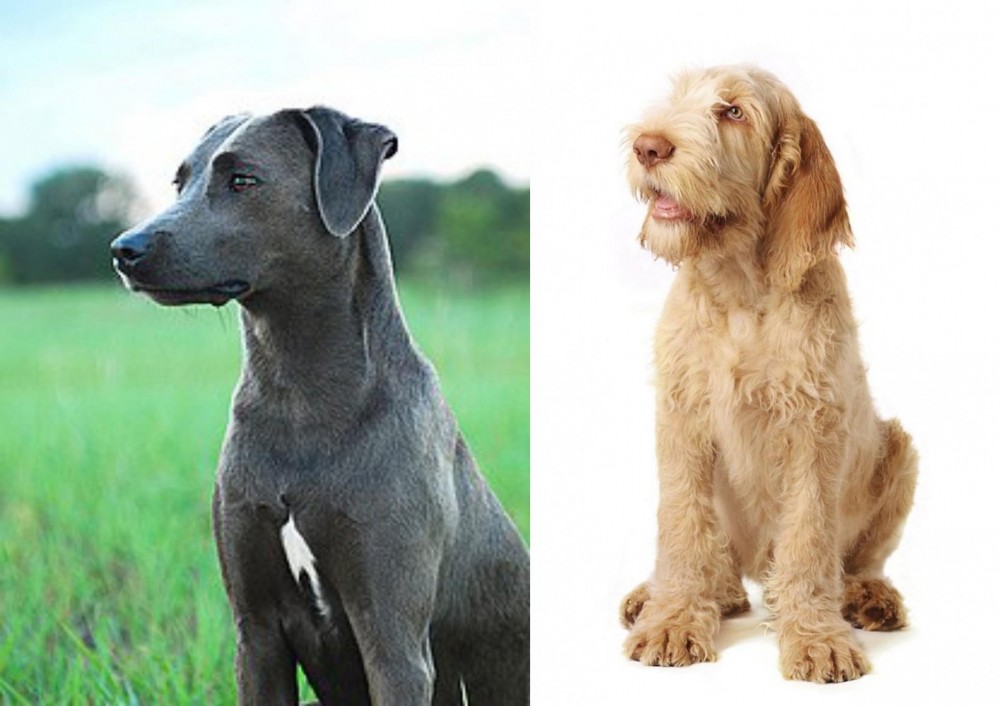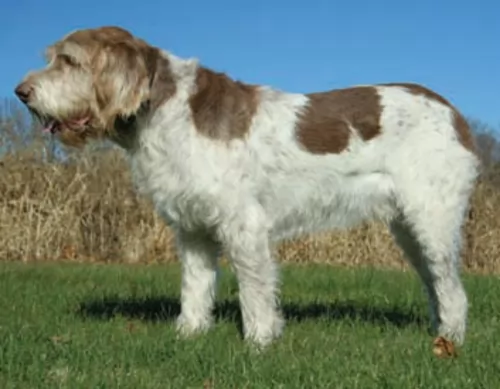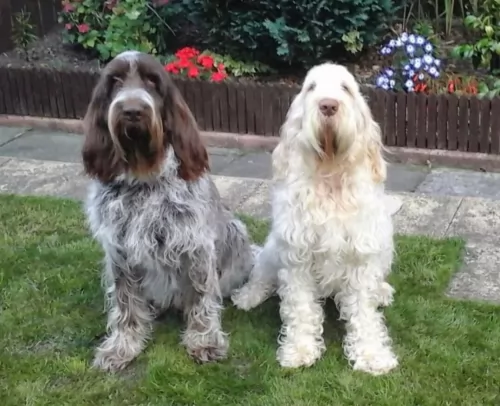 Petzlover
Petzlover Blue Lacy is originated from United States but Spinone Italiano is originated from Italy. Blue Lacy may grow 17 cm / 6 inches shorter than Spinone Italiano. Blue Lacy may weigh 16 kg / 35 pounds lesser than Spinone Italiano. Blue Lacy may live 7 years more than Spinone Italiano. Blue Lacy may have less litter size than Spinone Italiano. Blue Lacy requires Low Maintenance. But Spinone Italiano requires Moderate Maintenance
Blue Lacy is originated from United States but Spinone Italiano is originated from Italy. Blue Lacy may grow 17 cm / 6 inches shorter than Spinone Italiano. Blue Lacy may weigh 16 kg / 35 pounds lesser than Spinone Italiano. Blue Lacy may live 7 years more than Spinone Italiano. Blue Lacy may have less litter size than Spinone Italiano. Blue Lacy requires Low Maintenance. But Spinone Italiano requires Moderate Maintenance
 The Lacy brothers came to Texas in 1858, and this breed is named after them. They wanted a strong, robust working dog. It is a working/herding dog breed that originated in Texas in the mid 19th century.
The Lacy brothers came to Texas in 1858, and this breed is named after them. They wanted a strong, robust working dog. It is a working/herding dog breed that originated in Texas in the mid 19th century.
It is interesting to note that in June 2005, Governor Rick Perry brought about legislation adopting the Blue Lacy as the official Dog Breed of Texas. The breed is also registered by the National Lacy Dog Registry and the Animal Research Foundation.
Today the Blue Lacy is considered to be the perfect all-around dog, with the Lacy family history noting the breed to come from a mix of scent-hound, greyhound and coyote cross. There are theories around the scent hound used, with some believing it could have been an Italian Gray Hound, but whatever the case, the Lacy brothers established this breed under the guidelines required to develop a recognized breed.
 This Italian breed has an ancient blood line tracing all the back to 500 BC. Originally bred to hunt, he is today a friendly, alert and loyal companion. He is intelligent enough to do any job you give him. The Spinone is thought to be one of the oldest gun dogs ever, but it is not entirely clear that he came from Italy. There are some who think he may have come from somewhere in these European countries – Italy, Greece, France, Celtic Ireland, Spain or Russia. However, most believe the breed came from Italy in the Piedmont area.
This Italian breed has an ancient blood line tracing all the back to 500 BC. Originally bred to hunt, he is today a friendly, alert and loyal companion. He is intelligent enough to do any job you give him. The Spinone is thought to be one of the oldest gun dogs ever, but it is not entirely clear that he came from Italy. There are some who think he may have come from somewhere in these European countries – Italy, Greece, France, Celtic Ireland, Spain or Russia. However, most believe the breed came from Italy in the Piedmont area.
The most common thinking is that he is a descendent of the Spanish Pointer and/or the Russian Setter. One other theory is that setters from Greece were brought to the Roman Empire and crossed with a variety of Italian dog to make the coarse haired Spinone we see today. Then the French put in their claim that the breed is a cross of many French pointers.
The theory that counts might just belong to the Italians who believe the ancestor to the Spinone includes the German Wirehaired Pointer, the Pudelpointer and the Wirehaired Pointer. It was not until the 19th century that the name Spinone was officially given to the breed.
Before that it might have been known as a Spinoso and named after a thorn bus in Italy called the Spino. This bush was so thick and sharp that small prey animals learned to hide under it because the predators could not get through it. The Spinone however was able to fight through the briars with its thick, coarse hair and tough skin.
The breed almost became extinct during the second world war as before and after the hunters in Italy had started to use other breeds for hunting. Breeders also began to cross the Spinone with wire hairs like German Wirehaired Pointer, the Wirehaired Pointing Griffon and the Boulet.
The most popular hunting dog in Italy today is the Bracco Italiano while the Spinone is still used for hunting.
 The medium-sized, well proportioned, muscular and lithe Blue Lacy stands at roughly 46–53cm. He has a coat which is smooth and short and in an attractive gun-metal gray color which can be classified as blue or almost black. Other shades are also available such as cream, yellow, reddish and you also get tri-colored Lacy’s.
The medium-sized, well proportioned, muscular and lithe Blue Lacy stands at roughly 46–53cm. He has a coat which is smooth and short and in an attractive gun-metal gray color which can be classified as blue or almost black. Other shades are also available such as cream, yellow, reddish and you also get tri-colored Lacy’s.
Pure Blue Lacy’s have some white markings on their brisket. Whatever color you have, these clean-looking dogs with their low maintenance coats are referred to as Blue Lacy’s. Their brown eyes are bright and alert, they have long tails and their ears hang down.
The American Blue Lacy gives one the sense of speed, agility and endurance. He is intelligent, active and alert, being an all-round dog who can adapt to being among ranchers and cowboys and then become gentle with children and his family.
With socialization, he is also tolerant of other dogs. Because he is so intelligent he can be quickly trained, and training and socialization will be recommended for him to ensure he is the perfect all-rounder he was designed to be. His alertness makes him an excellent watch dog.
 The breed is made up of strong, solid and muscled dogs that have an almost square build. His legs are made to travel any terrain and his head is long with an occipital that is pronounced and unique to the Spinone. They are said to have “human appearing eyes”, with a docked tail in countries allowing it and webbed paws.
The breed is made up of strong, solid and muscled dogs that have an almost square build. His legs are made to travel any terrain and his head is long with an occipital that is pronounced and unique to the Spinone. They are said to have “human appearing eyes”, with a docked tail in countries allowing it and webbed paws.
Shorter hair covers their feet, head, legs, muzzle and ears. They have longer hair on their eyebrows and it is stiff, with soft hair on the muzzle and cheeks with a beard and mustache. It is a single coated dog though the coat is rough. They should have skin, lips, nose, and pads in colors that coordinate with their coats. For white dog it is a red-orange color, brown in dogs that are roan colored and dark red-orange in the orange and white colored dog.
 Your Blue Lacy is such a low-maintenance, easy dog to have. Remember to have your puppy vaccinated from distemper, hepatitis, leptospirosis, parvovirus, and parainfluenza. These vaccinations start from 6 - 8 weeks of age. Also, because different areas have different regulations surrounding the rabies injection, check with your vet about this one.
Your Blue Lacy is such a low-maintenance, easy dog to have. Remember to have your puppy vaccinated from distemper, hepatitis, leptospirosis, parvovirus, and parainfluenza. These vaccinations start from 6 - 8 weeks of age. Also, because different areas have different regulations surrounding the rabies injection, check with your vet about this one.
A socialized, trained Blue Lacy makes such an awesome pet but you have responsibilities towards him. You need to know precisely what is required to keep him healthy and happy.
This is a versatile working dog who is intelligent and alert but also sensitive to being mistreated. Treat him decently and in exchange you’ll have a loyal, devoted canine family member.
 3.Adaptability – Young dogs need a lot of attention but they don’t need a lot of space. The young dogs are energetic while the adult dogs are laid-back. They need exercise every day and at least a small back yard.
3.Adaptability – Young dogs need a lot of attention but they don’t need a lot of space. The young dogs are energetic while the adult dogs are laid-back. They need exercise every day and at least a small back yard.
 The Blue Lacy is generally a healthy breed, but just like with any other dog breed they will be prone to some health conditions. Blue Lacys can also suffer with the likes of hip or elbow dysplasia and hypothyroidism.
The Blue Lacy is generally a healthy breed, but just like with any other dog breed they will be prone to some health conditions. Blue Lacys can also suffer with the likes of hip or elbow dysplasia and hypothyroidism.
This is a disease of the hip where the ball and socket joint is malformed. Hip dysplasia is when the hip joints don’t develop normally. It needs to be watched as it can result in loss of function of the hip joints. The disease can often begin when the dog is still very young.
Some breeds are genetically predisposed towards hypothyroidism, but environmental factors and certain medications can trigger autoimmune reactions. Not only that, a tight collar can also cause thyroid damage. The symptoms of hypothyroidism are weight gain, skin problems, dislike of the cold and even hair loss and then it’s time to get your pet thyroid-tested.
 This is an ancient breed with not a lot of documented genetic issues, but it does have one deadly condition.
This is an ancient breed with not a lot of documented genetic issues, but it does have one deadly condition.
• Cerebellar ataxia (CA) is inherited and hits the puppies. Because it is a recessive gene both the mother and father must carry it for the puppy to inherit it. This makes it less likely than it would be otherwise. Puppies with the condition do not live more than a year. Since it is a genetic problem there is now a test for it that identifies carriers at a 95% accuracy rate.
• Like many other large breed dogs, they are susceptible to hip dysplasia. This can cause arthritis and/or lameness. There are now hip replacement surgeries available for this condition.
• Bloat is again common in large dogs and you need to watch for it with the Spinone. It can be deadly if not treated immediately. Let your dog rest quietly after eating. Do not let her exercise or play energetically after eating.
 Typically of working breeds, the Blue Lacy is going to need a firm owner who provides guidance and leadership, and who is responsible with providing the Lacy with plenty of exercise. This dog was created for work, so they will be totally at home on a farm. If not, they will require long walks every day with lots of ball games too.
Typically of working breeds, the Blue Lacy is going to need a firm owner who provides guidance and leadership, and who is responsible with providing the Lacy with plenty of exercise. This dog was created for work, so they will be totally at home on a farm. If not, they will require long walks every day with lots of ball games too.
Care for the Blue Lacy doesn’t take much effort. He isn’t much of a shedder and therefore has low grooming requirements. He’ll require being brushed twice a week to get rid of loose hairs. If you start early with this grooming routine, he looks forward to this ‘bonding’ session.
Routine maintenance will require nail clipping and teeth cleaning as plaque can build up and leave your pet with dental problems and gum disease. Ask your veterinarian about dental care because there are special dog-designed toothpastes and brushes. Also check for ticks and fleas in and around the ears of your dog.
Your Blue Lacy is a high energy working dog so he will require a balanced diet to cater for his energy levels. He will certainly require some raw meat from time to time to avoid skin problems. Home prepared meals are also good and these can include rice, meat and vegetables.
Remember when in any kind of doubt, speak to your vet about dog food which meets the requirements of your dog, his age, his breed and his activity levels. Always have a bowl of clean, cool water available to him around the clock.
 1Feeding the puppy – feed a high quality dog food for puppies of large breeds. Feed 3-4x day but don’t overfeed or let him exercise after eating even as a puppy.
1Feeding the puppy – feed a high quality dog food for puppies of large breeds. Feed 3-4x day but don’t overfeed or let him exercise after eating even as a puppy.
2.Feeding the adult - feed a high quality dog food for large breeds. Feed 1-2X day but don’t overfeed or let him exercise after eating.
4. Games and Exercises – The Spinone is an active breed, but not a fast dog. In fact, they like to travel at a trot so it becomes a great dog for jogging or running with. They love to jump, track, hunt, hike. They do well with agility, retrieving, flyball, carting, being a therapy dog, a rescue dog and a watchdog.